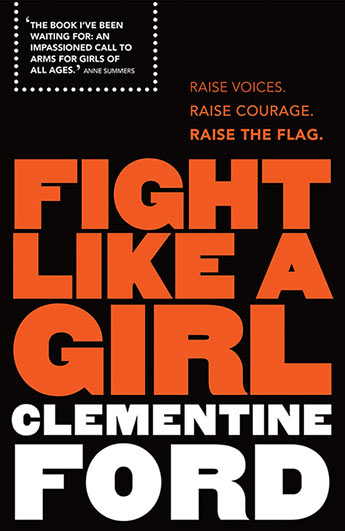lip lit: fight like a girl
Fight Like a Girl is a rousing memoir-meets-manifesto by Clementine Ford. Though casual in tone, it is persuasive and confronting. Ford shares her experiences as a woman claiming her space in the world and exposes the brutality of life as a woman, which we are raised to be oblivious to. You finish the book angry – and rightly so.
Ford has been a vocal presence in Australia’s feminist scene for many years. From her popular column for Daily Life to her huge social media following, she is hard to miss. She is a controversial figure, and her hard-line stance against trolls has garnered a lot of criticism online. But as she explores in Fight Like a Girl, standing up to these bullies is imperative, and “likeability” is a ridiculous concept. When faced with online harassment, women are usually told there is nothing to be done but to walk away. But why should women be told to remove themselves from a hurtful position, rather than men told to stop saying hurtful things? If a man loses his job because his hate is reported, why is that the fault of the woman who reported it? These are the questions that fill Fight Like a Girl and infuriate the reader.
Reading about the hypocrisy of the men who attack Ford from behind the safety of a computer screen filled me with a profound sense of anger. These men place the blame for violence on women, who should know better than to drink/walk home at night alone/wear skirts, but also cry ‘Not All Men!’. My only sadness about this book is that these people, the type of people who desperately need to see how their words have an effect and how illogical their positions are, are the least likely to read it.
Many reviewers have claimed this book is a must-read for teenage girls, and it is, but I think more importantly, it is a must-read for young men. As Ford charts her journey through childhood to adulthood, she shows how hard it is to be a woman, and this is something many men struggle to accept. Even the best-intentioned “nice” guys of my friendship group are shocked to know their female friends walk home with keys between their knuckles. They do not see sexism or violence as something that affects them because they don’t actively participate in it. A book like this serves to show that this attitude is not good enough.
Fight Like a Girl is not a nuanced book. The voice is colloquial and comes from lived experience rather than theory. It is therefore limited in scope, but Ford owns the narrowness of her experiences at the start, and the book does not claim to delve into the riches of feminist theory. Instead, and perhaps more importantly for our generation, it is a consciousness-raising book. It reminds readers to be angry, because there is a lot to be angry about. It is a launching pad into a world of intersectional reading, and more specific advice on how to rock the status quo.


